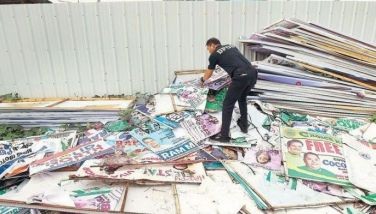CBCP's highest council to take over probe on PCSO fund mess
MANILA, Philippines - The highest council in the Catholic Bishops’ Conference of the Philippines (CBCP) will take over the investigation on the fund mess of the Philippine Charity Sweepstakes Office (PCSO) concerning members of the clergy.
CBCP president Tandag, Surigao del Sur Bishop Nereo Odchimar said the issue was brought before the Permanent Council to make the investigation into the issue, which he said, was “deemed urgent in character.”
“The CBCP Permanent Council would now take over the inquiry to provide for a more broadly represented panel to conduct an inquiry by peers.” Odchimar chairs the Permanent Council.
Odchimar said the Permanent Council remains the highest governing body in the CBCP under its charter.
The Permanent Council is composed of a chairman, vice chairman, and 10 regional representatives from Luzon, Visayas and Mindanao, which “can be convened by the CBCP president at any time to discharge its functions for special purposes, including some particular inquiry that seems urgent in character.”
“Moreover, as the CBCP Plenary Assembly, the CBCP highest decision-making body, and its meeting on Monday, the Permanent Council can continue to act for and on its behalf with regard to the inquiry, and to address all public concerns related to it,” Odchimar said.
The CBCP earlier conducted its own probe into the PCSO mess on July 2 through its Committee on Bishops’ Concern (CBC) chaired by emeritus Cebu Archbishop Ricardo Cardinal Vidal.
Odchimar said Cardinal Vidal was able to interview each of the concerned bishops who received the funds from the PCSO to purchase vehicles.
The prelates concerned include Lagawe Bishop Rodolfo Beltran in Bontoc, Abra Bishop Leopoldo Jaucian, Cotabato Archbishop Orlando Quevedo, Zamboanga Bishop Romulo Valles, Ilocos Sur Bishop Ernesto Salgado, Butuan Bishop Juan de Dios Pueblos, and Isabela Bishop Martin Jumoad.
The CBCP held its 103rd plenary assembly starting yesterday to vote its new set of officers and tackle pressing issues.
Odchimar said the plenary gathering is expected to tackle the PCSO fund mess issue as well as the Reproductive Health (RH) bill pending approval at the House of Representatives.
It was gathered that five of the seven bishops tagged in the PCSO fund mess attended the three-day plenary session.
Former Masbate vice governor Antonio Medina of the Catholic Vote Alliance (CVA) said the assistance made by the PCSO to the bishops “should not be construed as impinging on the principle of separation of Church and State as they both can work together in alleviating the plight of the poor.”
Medina also suggested the PCSO’s disclosure on Bishop Pueblos regarding the “birthday gift” of a Mitsubishi Pajero given to him through the PCSO funds could have been motivated to place the prelate in a bad light.
It could also be a result of Pueblos’ earlier call for President Aquino to resign, he said.
Medina also pointed the money donated to the bishop was minuscule compared to the P100 million plus given to lawmakers and local officials.
He said it was not only former President Gloria Macapagal-Arroyo who allegedly tolerated the handing of donations to members of the Catholic Church.
Medina said even during the term of former President Fidel Ramos, several millions of pesos were spent by the government for the renovation of the Barasoain Church in Malolos, Bulacan for the inaugural and oath-taking of his successor, former President Joseph Estrada.
The government also spent through the Philippine Tourism Authority (PTA) some P20 million for the renovation of the Miag-ao Church in Iloilo that was declared a national shrine by the National Historical Commission.
“This proved that the constitutional ban on use of government monies and properties for church purpose was transgressed and is no longer attuned and responsive to the times if not antiquated,” Medina said.
Medina also appealed to the PCSO not to single out the bishops.
It should “come out with the records of the donations and grants it made to hospitals, charitable institutions, orphanages, homes for the aged, and the like whether run or managed by the Catholic religious, prelates, protestants, and other sects in order to avoid the perception that the Catholic Church and her bishops were being singled out.” Medina said.
He suggested that Congress review the Constitution and enact a law allowing a multi-sectoral and multi-religious poverty-alleviation endeavor with government funding.
- Latest
- Trending

































